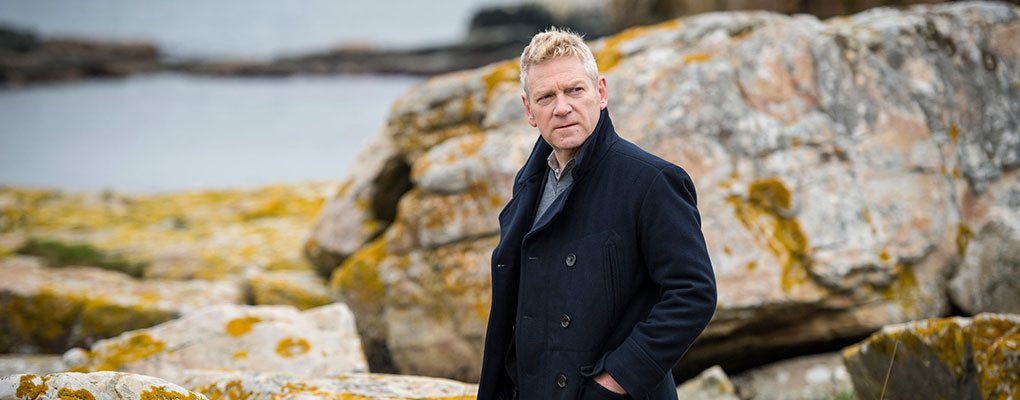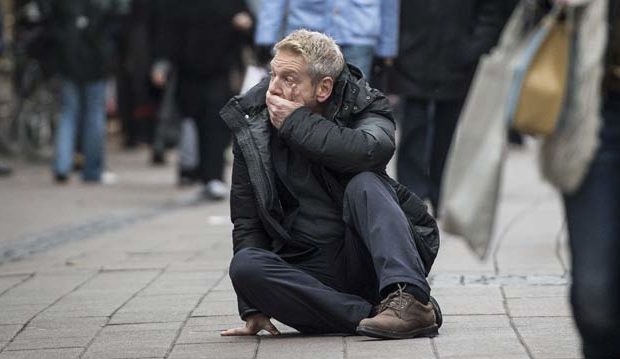
Kurt Wallander: It’s just moments, now, Dad. Everything. Just moments now. They don’t join up.
Povel Wallander: What don’t?
Kurt: My memories. My life doesn’t join up. Can’t remember.
Povel: Someone else will remember. Someone will remember for you.
While watching episode two of Wallander, series four, I began to see the writing on the wall for one of my favorite detectives. A stove left on, nearly burning down the house; a gun left on the seat at a restaurant, endangering a small girl who picks it up. The “writing” on this wall wasn’t written in words, however, but in the slow, crumbling decay of Wallander’s mind. I instantly recognized these signs as the moments of forgetfulness that litter the landscape of my father’s life currently. I should have seen this coming from the very first episode as Kurt cared for his dad who suffered from the same thing my own father does: Alzheimer’s. I had, in fact, forgotten this and the bright lucidity of it came back with a vengeance. By the end of the second episode, I knew what I would be getting myself into with episode three. I knew his end before he did: fiction’s cathartic ability to give prescience to creatures who have none. This prescience gives persons like me a bird’s eye view of a revelation’s effect on people, like myself, when they may not see it in the moment of their own similar revelations.
In “The Troubled Man,” Kurt Wallander is being killed off, but not in the usual way. Wallander learns he has Alzheimer’s—probably the result of a genetic predisposition passed down to him from his father. His end will be a slower death; a thief in the night of his mind. As I wrote about not too long ago, it always seemed to me that Wallander’s end would be pulling the trigger on a gun or a bottle. The storyline of Wallander’s relationship with his ailing father, Povel, appeared in the earlier episodes and faded away in the subsequent episodes after Povel’s death on the show.

This is often the way it happens in life: a narrative subplot that runs underneath our lives while we go on forging our own destinies—creating our chosen narratives—then becomes the central plot, often against our wills. Wallander would not include this in his story. My father would not either. Nor would I. No one would. Suffering has a brutal way of ripping us out of our solipsistic illusions. It’s an invitation to see reality with more clarity and to invite others into the parts of our lives we hide away.
In this final episode of Wallander, we not only experience Kurt’s final case as a detective–involving his daughter’s father-in-law’s dark war past–but we see the deconstruction of a man. With every labored step he takes–his weakened sway on the way up a stair, his disorientation while driving and during conversations–Wallander is becoming someone new, someone no one recognizes. Not his daughter, Linda. Especially not him.
When Linda finds her father manically chasing ghosts behind his house, she chases after him to calm him down, and his only response is to strip off layers of his clothes and violently fling them at her. When a semblance of calm finally overcomes him, she knows instinctively that in that moment he doesn’t recognize her. He asks her, “You are my daughter?” Her eyes, her gestures, and the embodied fears on her face are something I recognize, personally. It is something my sister recognizes. Our father still knows us, but we know he won’t always. We know that disconnect will come. That deepest connection severed. Kurt hasn’t stopped being her father, but he could no longer distinguish her from the sea of faces. No longer being known by someone who has loved and cared for you is a death. All of a sudden this adult is reduced to the scared, tearful child they once were–crying on the phone or over the sticky kitchen countertop of a rent house. We need our father, we need our mother, but our father or mother no longer knows us.
There are two key scenes in this episode that moved me because of their realism and their profundity. The first scene is the conversation that takes place between Linda and Kurt directly after the above scene. Linda asks Kurt what the disorientation is like:
Kurt: I can’t explain at all. It’s a different thing. Sometimes I can’t…can’t even imagine where I was supposed to be. You kind of, kind of hit a wall. Yeah, you try and go through it but you can’t, so you try to go over it, try to go around it some other way, but you get…you get so anxious. You get anxious, you get angry. You know I just try to…I just try to think back to things that I-I-I know have happened. I think they must have happened. It’s just…it’s just that the pictures aren’t there anymore. It’s like a lot of things I’m solving…
Linda: Why didn’t you tell me? I’m your daughter.
Kurt: Because you’re my daughter. Because you’ve got a daughter of your own. Because I’m the son of a father who had this…
Linda: Well, let me decide. (Sigh.) It’s gonna be hard, but it is as it is. We just have to find a way to…(sigh)…
Kurt: I don’t want you to have to look after me.
Linda: I want to. I choose to.
This moment, with the weeping eyes of both characters, was a freight train without brakes. For one, I know that I (and my sister) have had those heavy moments between my dad and me where no words or few words are spoken but we are both on the verge of weeping because we both know what is going on. He is still aware of what is happening, of who we are and of what is remaining that will be taken away. And, in another way, I understand Kurt when he identifies himself as being “the son of a father who had this.” I am the son of a father who has Alzheimer’s. I only hope I have the love-driven desire to choose suffering alongside my dad in the way Linda does for her dad in this scene: to know what is ahead and choose to walk alongside what is bad instead of running away. This is a choice made within the freedom of love.
Another scene comes at the very end, a conversation between Kurt and his deceased dad, which is contained in the quote at the beginning. For some reason, this conversation put a lot of things in perspective in the midst of the cruelty of the disease that is affecting my dad and countless other people in the world. Right now, his life doesn’t join up. It’s just moments, disconnected. It is easy to see this in his growing inability to track a conversation or to remember and piece together words to form a complete and cogent sentence or thought. It is a terrifying characteristic for a man who taught his kids to be critical thinkers.
However, Povel’s final words to Kurt in this scene are joyfully heartbreaking: “Someone else will remember. Someone will remember for you.” The writers may not have intended this but God is written all over the spaces in between these words. Sure, on Earth, my father has his wife, his kids, his mother and friends to remember for him, just like Kurt has Linda. But, really, in the midst of intense suffering which destroys the person physically, mentally, and spiritually comes a promise from long ago. It’s a promise from the one who made us all, telling us: I remember. I remember for you. Be not afraid for I am with you. I will pick you up. I will save you. I will recall those promises you may forget. I finished it for you. I AM who remembers.
Wallander’s final bow reminded me of that promise. It is a balm for the soul; for my dad, for my family, and for me. The Lord remembers my dad and all of his memories, good and bad, so that my dad can rest in the calm of his Savior and the memory of God.

COMMENTS
3 responses to ““We Just Have to Find a Way to…(Sigh)”: Wallander and the Memory of God”
Leave a Reply
















Lovelovelove this show. Thanks for posting on it Blake!
Thank you for this. My father, Clyde, suffered from Alzheimer’s disease. He died on the eve of Palm Sunday in 2008 and was buried, oddly and wonderfully, on Good Friday of that Holy Week because my brother, who worked for the U.S. State Department in Iraq, had difficulty getting out Baghdad. I had these words printed at the end of the service leaflet for Daddy’s funeral in the Moravian church in North Carolina where my brother and I were baptized and where our faith, like his, was rooted in “The Savior’s Blood and Righteousness,” to quote a beloved German chorale: